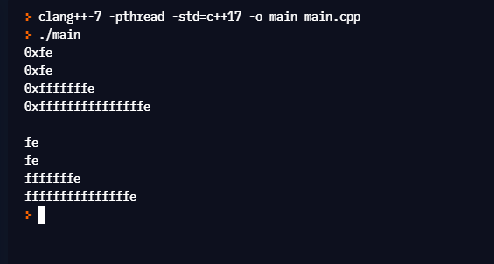Thanks to Lincoln's comment below, I've changed this answer.
The following answer properly handles 8-bit ints at compile time. It doees, however, require C++17. If you don't have C++17, you'll have to do something else (e.g. provide overloads of this function, one for uint8_t and one for int8_t, or use something besides "if constexpr", maybe enable_if).
template< typename T >
std::string int_to_hex( T i )
{
// Ensure this function is called with a template parameter that makes sense. Note: static_assert is only available in C++11 and higher.
static_assert(std::is_integral<T>::value, "Template argument 'T' must be a fundamental integer type (e.g. int, short, etc..).");
std::stringstream stream;
stream << "0x" << std::setfill ('0') << std::setw(sizeof(T)*2) << std::hex;
// If T is an 8-bit integer type (e.g. uint8_t or int8_t) it will be
// treated as an ASCII code, giving the wrong result. So we use C++17's
// "if constexpr" to have the compiler decides at compile-time if it's
// converting an 8-bit int or not.
if constexpr (std::is_same_v<std::uint8_t, T>)
{
// Unsigned 8-bit unsigned int type. Cast to int (thanks Lincoln) to
// avoid ASCII code interpretation of the int. The number of hex digits
// in the returned string will still be two, which is correct for 8 bits,
// because of the 'sizeof(T)' above.
stream << static_cast<int>(i);
}
else if (std::is_same_v<std::int8_t, T>)
{
// For 8-bit signed int, same as above, except we must first cast to unsigned
// int, because values above 127d (0x7f) in the int will cause further issues.
// if we cast directly to int.
stream << static_cast<int>(static_cast<uint8_t>(i));
}
else
{
// No cast needed for ints wider than 8 bits.
stream << i;
}
return stream.str();
}
Original answer that doesn't handle 8-bit ints correctly as I thought it did:
Kornel Kisielewicz's answer is great. But a slight addition helps catch cases where you're calling this function with template arguments that don't make sense (e.g. float) or that would result in messy compiler errors (e.g. user-defined type).
template< typename T >
std::string int_to_hex( T i )
{
// Ensure this function is called with a template parameter that makes sense. Note: static_assert is only available in C++11 and higher.
static_assert(std::is_integral<T>::value, "Template argument 'T' must be a fundamental integer type (e.g. int, short, etc..).");
std::stringstream stream;
stream << "0x"
<< std::setfill ('0') << std::setw(sizeof(T)*2)
<< std::hex << i;
// Optional: replace above line with this to handle 8-bit integers.
// << std::hex << std::to_string(i);
return stream.str();
}
I've edited this to add a call to std::to_string because 8-bit integer types (e.g. std::uint8_t values passed) to std::stringstream are treated as char, which doesn't give you the result you want. Passing such integers to std::to_string handles them correctly and doesn't hurt things when using other, larger integer types. Of course you may possibly suffer a slight performance hit in these cases since the std::to_string call is unnecessary.
Note: I would have just added this in a comment to the original answer, but I don't have the rep to comment.


sizeof(your_type)*2is a bit ugly;numeric_limits<your_type>::digits/4is cleaner. – Magallanes